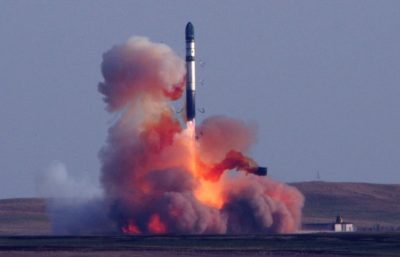US Lawmakers Introduce Bill to Kill Prospects for Arms Control
A Russian Point of View

US Senator Tom Cotton and Congresswoman Liz Cheney have introduced a bill that prevents extending the New Strategic Arms Reduction Treaty (New START) with Russia or the Stopping Russia Nuclear Aggression Act. It says “Under no circumstances should the United States agree to extend the New START Treaty beyond the current expiration in 2021 without drastic improvements to the deeply flawed deal.” The bill includes the provision of Russia’s agreement to verifiably reduce its stockpile of tactical nuclear weapons. It also stipulates that the new weapons mentioned in the President Putin’s famous speech in March must be included into the count.
New START limits the US and Russia each to no more than 1,550 deployed strategic warheads and 700 deployed strategic delivery vehicles. Effective since 2011, the agreement covers a 10-year period until February 2021 with the possibility of a five-year extension. So far, the talks on extending the agreement have not been kicked off to the dismay of many arms control wonks.
President Donald Trump has announced his intention to jettison the 1987 Intermediate-range Nuclear Forces (INF) Treaty citing Russia’s alleged “violation” and the “threat” supposedly coming from China. Decried by the president last year, New START may be next up on the chopping block. He does not like anything done during President Obama’s tenure. The other option is an analog of the 2002 Strategic Offensive Reductions Treaty (SORT), which limited deployed warheads without verification provisions. According to Andrea Thompson, Undersecretary of State for Arms Control and International Security, the future of New Start depends on Moscow’s readiness to limit the new strategic systems President Putin mentioned in his famous speech in March.
It’s important to note that there are no Russian violations to blame for a US decision not to extend the treaty or pull out from it. President Trump will have to substantiate the reasons for another preemptive treaty withdrawal after the intention to pull out from the INF Treaty was announced. Russian President Vladimir Putin has repeatedly expressed interest in extending New START, although Moscow has concerns about the US removing nuclear weapons launchers from accountability under the agreement.
What’s wrong with the bill and why is it important to address the pertinent problems before it goes to the appropriate committees?
First, the tactical weapons in Russia’s inventory have nothing to do with strategic nuclear forces (SNF). Cruise missiles and nuclear-powered torpedoes are not part of any international agreement. There is no precedent of including them into the SNF agenda. The sea-based tactical nuclear weapons have been covered by presidential nuclear initiatives (PNIs). Tactical nukes have always been a separate subject. No treaty covers them. The condition of including them into strategic nuclear reduction talks is unacceptable. If the bill becomes law, no strategic arms agreement will be possible ever.
Now about the new weapons the Russian president told about. The Sarmat ICBM is replacing the Voevoda silo-based system, which is covered by New START. It does not add to the existing potential. The Kh-101 air-to surface missile has no relation to the treaty – it’s neither a strategic weapon nor a delivery means. The same way the Avangard glide vehicle does not breach New START when installed on the Sarmat or a carrier that does not fall into the category of heavy missiles. This system is neither a bomber, nor a ballistic missile. In theory, some of the weapons in question can be included into the agenda but it depends on Russia’s goodwill.
The overall deterioration of the relations between Russia and the US may provoke lawmakers into backing any anti-Russian bill. Adopting such an approach means shooting oneself into the foot.
When the bill goes to the floor, congressmen should remember two things. First, New START is not only about numbers. It includes the exchange of valuable information, which is hard to get by other means, and the unique and very reliable verification procedures. Second, with no SNF agreement in place, the world would have nothing to prevent an unfettered arms race. Another option is extending New START to buy time for thorough discussions on another treaty to replace it. But in this case they will have to say no the Cotton-Cheney-introduced bill.
*
Note to readers: please click the share buttons above. Forward this article to your email lists. Crosspost on your blog site, internet forums. etc.
Andrei Akulov is a retired colonel, Moscow-based expert on international security issues.
Featured image is from SCF

